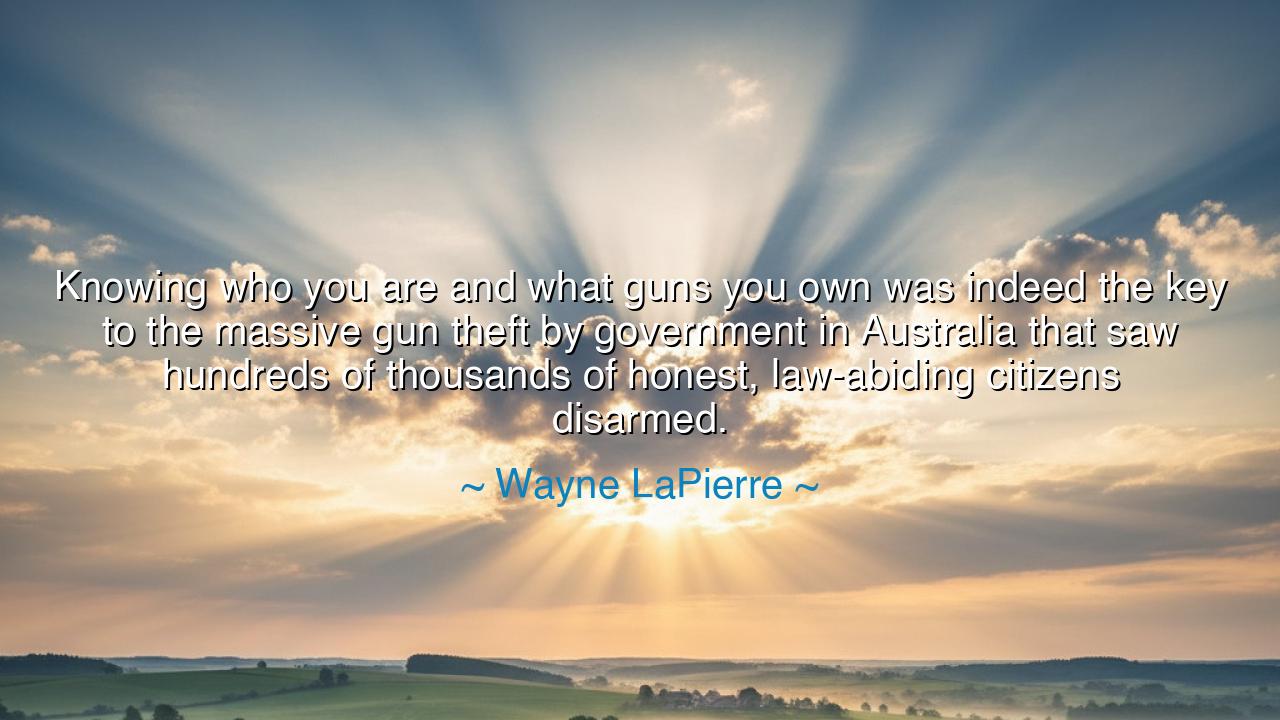
Knowing who you are and what guns you own was indeed the key to
Knowing who you are and what guns you own was indeed the key to the massive gun theft by government in Australia that saw hundreds of thousands of honest, law-abiding citizens disarmed.






When Wayne LaPierre declared, “Knowing who you are and what guns you own was indeed the key to the massive gun theft by government in Australia that saw hundreds of thousands of honest, law-abiding citizens disarmed,” he spoke with the fervor of one warning a free people against the oldest temptation of power — the desire to control through fear. His words, sharp and cautionary, rise not only from political conviction but from the deeper understanding that liberty and vigilance are bound together. For when a government learns to track every weapon, it also learns to track every will, every independence, every heartbeat that might one day stand against it. In this sense, LaPierre’s message was less about the weapons themselves and more about the moral principle of self-sovereignty — the right of individuals to guard their own destiny.
The origin of this quote lies in the aftermath of the 1996 Port Arthur massacre in Australia, a tragedy that shook the world and left the nation in mourning. In response, the Australian government, under Prime Minister John Howard, enacted sweeping gun control measures, including a massive mandatory buyback program. Over 600,000 firearms — many belonging to ordinary, law-abiding citizens — were confiscated or surrendered. To LaPierre and many defenders of the Second Amendment in America, this event was not merely a policy choice, but a turning point in the relationship between citizens and the state. His words reflect a belief that such actions, no matter how well-intentioned, set a precedent where the government, armed with knowledge of its citizens’ private arms, could transform from protector into master.
In the style of the ancients, we might say that LaPierre’s warning is the echo of a truth whispered across centuries — that power, once trusted without restraint, seldom returns what it takes. From the fall of the Roman Republic to the rise of modern empires, history has shown that liberty dies not with a shout, but with a signature, a decree, a promise of safety. The act of disarmament, even clothed in reason, carries within it the seed of submission. For weapons have always symbolized more than strength — they have represented the right of a person to stand as their own guardian. When this right is surrendered, the people become wards of the state, reliant not on courage, but on permission.
Consider the lesson of Imperial Japan before the Tokugawa shogunate. When the ruling class seized weapons from peasants under the pretense of maintaining peace, they built a society that was stable — but silent. The sword became the privilege of the few, and the voice of the many was stilled. The result was not harmony, but hierarchy. So too in every era, when rulers claim that disarmament brings peace, they may indeed bring order — but it is an order without equality, a peace without dignity. LaPierre’s warning, therefore, is not merely about guns, but about trust and dependency — about what happens when a people forget that freedom, once lost, cannot be reclaimed by pleading.
There is an emotional power beneath his words — a sense of sorrow for what he perceives as the fading of self-reliance in the modern world. To him, the Australian gun confiscation was not only a policy but a parable: how quickly fear can persuade good men to relinquish their rights. In his view, those “honest, law-abiding citizens” were not the cause of violence, yet they bore the cost of another’s crime. It is a timeless irony — that the virtuous are often punished in the name of protecting them. And when such punishment becomes policy, it marks a deeper fracture: a loss of faith in the citizen’s ability to govern himself.
LaPierre’s statement, though controversial, stirs the same questions that have haunted philosophers and revolutionaries alike: Where does safety end and servitude begin? Can a people truly be free if their means of defense are regulated by the very power they are meant to keep in check? His words recall the old Roman adage: “He who desires peace, prepare for war.” Not as a call to violence, but as a reminder that peace endures only where strength and independence are preserved. A free society must balance compassion with caution, and must never allow tragedy to become the tool by which liberty is undone.
The lesson of Wayne LaPierre’s quote is one of eternal vigilance. It teaches that every generation must guard its freedoms as one guards a sacred flame — not with arrogance, but with awareness. Governments, like men, are fallible. They must be watched, questioned, and restrained by the people they serve. The tools of defense — whether physical or moral — are not symbols of rebellion, but of responsibility. To own them is to affirm one’s role as both citizen and sentinel.
So let his words be remembered not merely as a warning about weapons, but as a plea for self-determination. Let future generations learn that liberty, once traded for safety, yields neither; that a government too powerful to fear its people is a government too powerful to serve them. For in every age, the price of freedom is not only courage, but remembrance — the remembrance that power, unchecked, devours the very souls it claims to protect.






AAdministratorAdministrator
Welcome, honored guests. Please leave a comment, we will respond soon